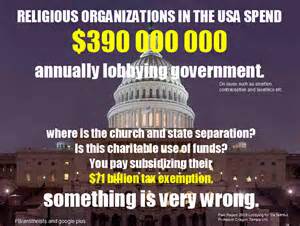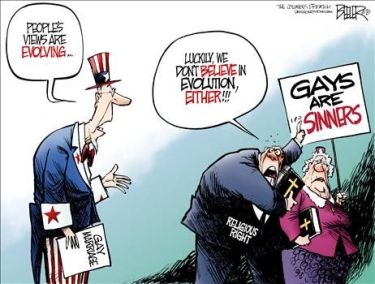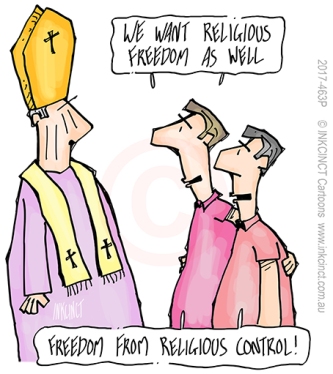Survey: Folks are leaving church because of mean people
Posted by Warm Southern Breeze on Thursday, March 28, 2024
Here’s your
“Well… Duh! No shit, Jack!”
moment.
You know things are pretty bad when “sinners” (atheists, agnostics, humanists, et al) know when religious folks are not practicing what they preach, and call out their blatant hypocrisy… and even Jesus agrees with them.
“I tell you the truth, corrupt tax collectors and prostitutes will get into the Kingdom of God before you do.”
— Jesus of Nazareth, Matthew 21:31 (NIV)
Instead of establishing and promoting tax-free corrupt religious empires in order to facilitate, perpetuate, and obfuscate sex crimes by shuffling perpetrators and prime suspects across state lines and international borders, isn’t it time we started talking about taxing churches?
Formerly, religion was thought of as a “moral good,” an imperative of immense societal importance, imagining (falsely) that people cannot be moral, ethical, virtuous, righteous, pious, or even devout, without religion. Granted, piety and devoutness have often been used to characterize behaviors in religious terms, but those 2 words have neither exclusively ecclesiastical, nor uniquely religious application or use — as their etymology (history of a word’s origin, derivation, and usage) indicates — even though they have been co-opted for that purpose.
But, people can be, and are, good, without religion, without practicing religion — belief in an ethereal, often-supernatural being(s), which often are superlative to humans, frequently possessing omnipotence, omniscience, and omnipresence, among other super-powers.
It’s as if We The People want someone like us, but simultaneously not like us, to whom we can give obeisance… and alms. Can’t have religion without money, you know. At least in America, you can’t.
And so, we have created our very own god — a veritable golden calf, only this one is green, his name is Benjamin, has no intrinsic value, but is backed by the “full faith and credit” of the government of the United States.
Naturally, my god is better than, and superior to, your god, and so, we must fight to the death to determine whose god will win, whose theology will prevail, whose rules we will obey, and upon whom we will force the arcane doctrines, under penalty of law… even imposing death if it so warrants. And there are many, for the arrest of thousands, upon thousands for infractions of the most picayune type.
Hair too long? Too short? Pants too tight? Bulges in the wrong places? Body parts poking through sweaters and snug-fitting tee-shirts? Shorts too short? Makeup? Work on Sunday? Saturday? Wednesday night?
After all, it’s what god wants.
Right?
But taxing churches…
The ostensible primary idea behind the elimination of tax responsibility and liability, is that churches and religious institutions provide an intangible public benefit such as the inculcation of ethics, morals, and values, in addition to providing corporeal, tangible relief and assistance to societies’ members in time of need, which exemplifies the practice of the ethic, the ideal, the standard to which the faithful hold themselves accountable… or not. At one time, churches, and religions in general terms, held up an ideal, one of education, of discovery, of contributing to society, of helping others, etc., though they are not often nowadays seen practicing what they once preached… even though they are given the same level (if not more) of legal deference and respect that they once were given, including substantially preferential legal treatment, which had the elimination of tax liability as its bedrock, private donations to which also enjoyed similar treatment, as well as the clerics who enjoyed such public largesse in the form of personal tax elimination.
Their abuses — aside from sexual crimes — are renown.
Houses fit for kings — literally, modern versions of British castles and princely estates, with tens of thousands upon tens of thousands of square feet, multiple stories (often, at least 3), and acres upon acres — even miles upon miles — of prime farm and forest land, often lain fallow, only rarely hunted, and farmed even less — are commonplace.
To compare, Frogmore Cottage, a more “humble” part of the Royal Windsor Estate in England, formerly known as Double Garden Cottage when it belonged to Queen Charlotte in 1801, had been divided into 5 separate housing units in the early 21st century and occupied by Windsor Estate workers, and later briefly became the former residence of the former Prince Harry and his bride Rachel Meghan Markle, former Duchess of Sussex, which they extensively renovated in 2019, previously had and now has 10 bedrooms, with 2 floors, on 33 acres.
Joel Osteen, whose net worth is estimated to be at least $100 million, and who owns Lakewood Church in Houston, TX, resides with his spouse and 2 adult children in a 17,000 square foot palatial property in Houston’s ultra-elite River Oaks neighborhood, a renown enclave of billionaires, which physical “footprint” encompasses 1.86 acres, cost $10.5 million, has 6 bedrooms, 6 bathrooms, 5 open wood fireplaces, 3 elevators, a 2-story, 2,800 square foot guest house with 2 bedrooms, 2.5 bathrooms, a full kitchen and laundry room, a 2-story, 1 bedroom guest house, a pool, and pool house… for 4 people (1,000 square feet with living area, kitchen, bathroom, complete with covered patio overlooking a large heated pool) — in addition to owning a somewhat “smaller,” though equally palatial, $2.9 million mansion in Houston’s elite Tanglewood neighborhood where the wealthy, well-connected, and well-to-do reside.
Fleets of luxuriously exotic hand-crafted boutique automobiles… equine barns replete with the trappings of immense wealth… herds of cattle fed an exquisitely bizarre diet comprised exclusively of macadamia nuts… custom-crafted air-conditioned dog houses with marble floors… private airports and hangars to house a fleet of private jets… those are but a few of the trappings of wealth enjoyed by billionaire Americans and teevee preachers, most all of whom pay NO INCOME TAX.
An infamous event in Houston, TX — Hurricane Harvey in 2017 — exposed their hypocrisy by denying refuge from the ravages of the storm to area residents rendered homeless by it. For that, they, and others like them, are rewarded with preferential tax treatment by the United States Government, most often as massive reduction, or outright elimination of any tax liability or responsibility, and certainly, no public accountability for their actions… or, more often, the lack thereof.
If religious do-gooders are not going to do good with their worldly material goods, they should be taxed, and the monies collected put to public relief.
People say they’re leaving religion due to anti-LGBTQ teachings and sexual abuse
March 27, 2024 5:00 AM ET
Heard on Morning Edition
by Jason DeRose at NPR headquarters in Washington, D.C. (photo by Allison Shelley)
https://www.npr.org/2024/03/27/1240811895/leaving-religion-anti-lgbtq-sexual-abuse
People in the U.S. are leaving and switching faith traditions in large numbers. The idea of “religious churning” is very common in America, according to a new survey from the Public Religion Research Institute (PRRI).
 It finds that around one-quarter (26%) of Americans now identify as religiously unaffiliated, a number that has risen over the last decade and is now the largest single religious group in the U.S. That’s similar to what other surveys and polls have also found, including Pew Research.
It finds that around one-quarter (26%) of Americans now identify as religiously unaffiliated, a number that has risen over the last decade and is now the largest single religious group in the U.S. That’s similar to what other surveys and polls have also found, including Pew Research.
PRRI found that the number of those who describe themselves as “nothing in particular” has held steady since 2013, but those who identify as atheists have doubled (from 2% to 4%) and those who say they’re agnostic has more than doubled (from 2% to 5%).
This study looked at which faith traditions those unaffiliated people are coming from.
Dr. Melissa Deckman, PhD, PRRI’s Chief Executive Officer, said that “35% were former Catholics, 35% were former mainline Protestants, only about 16% were former Evangelicals, and really, not many of those Americans are, in fact, looking for an organized religion that would be right for them. We just found it was 9%.”
That these people are not looking for a religion has implications for how and even whether houses of worship should try to attract new people.
Among other findings: The Catholic Church is losing more members than it’s gaining, though the numbers are slightly better for retention among Hispanic Catholics.
There is much lower religious churn among Black Protestants and among Jews who seem overall happy in their faith traditions and tend to stay there.
As for why people leave their religions, PRRI found that about two-thirds (67%) of people who leave a faith tradition say they did so because they simply stopped believing in that religion’s teachings.
And nearly half (47%) of respondents who left cited negative teaching about the treatment of LGBTQ people.
 Those numbers were especially high with one group in particular.
Those numbers were especially high with one group in particular.
“Religion’s negative teaching about LGBTQ people are driving younger Americans to leave church,” Deckman says. “We found that about 60% of Americans who are under the age of 30 who have left religion say they left because of their religious traditions teaching, which is a much higher rate than for older Americans.”
Hispanic Americans are also more likely to say they’ve left a religion over LGBTQ issues. Other reasons cited for leaving: clergy sexual abuse and over-involvement in politics.
The new PRRI report is based on a survey of more than 5,600 adults late last year.
About one-third of religiously unaffiliated Americans say they no longer identify with their childhood religion because the religion was bad for their mental health. That response was strongest among LGBTQ respondents.
The survey also asked about the prevalence of the so-called “prosperity Gospel.” It found that 31% of respondents agreed with the statement “God always rewards those who have good faith with good health, financial success, and fulfilling personal relationships.”
Black Americans tend to agree more with these theological beliefs than other racial or ethnic groups. And Republicans are more likely than independents and Democrats to hold such beliefs.




Leave a comment